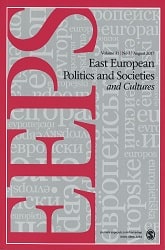Discourses of Violence and the Ideological Strategies of the Romanian Communist Party, 1944-1953
Discourses of Violence and the Ideological Strategies of the Romanian Communist Party, 1944-1953
Author(s): Kevin AdamsonSubject(s): Political history, Marxism, Government/Political systems, WW II and following years (1940 - 1949), Post-War period (1950 - 1989), History of Communism
Published by: SAGE Publications Ltd
Keywords: discourse theory; discourse analysis; Romania; political history; violence; ideology; legitimation; consent; Sovietization; Stalinism; Marxism-Leninism; Gheorghe Gheorghiu-Dej;
Summary/Abstract: Empirical research linking violence and ideology—and using discourse theory and analysis—could provide more nuanced insights into political strategies and social contexts associated with the violent imposition of new political orders. This study addresses one such case, that of the communist takeover in Romania between 1944 and 1953, engaging in an analysis of Romanian Communist Party (PCR) discourse. Using concepts from discourse theory as a tool to critically re-examine some of the most influential comparative and Romania-specific scholarship on communist regimes, the article suggests that the PCR’s rise to power was underpinned by a coherent ideological strategy. This involved the articulation of violence within a new discursive formation that sought to produce consent for the regime. In Romania’s case, these findings call into question the coercion/consent dichotomy that has framed many previous analyses.
Journal: East European Politics and Societies
- Issue Year: 21/2007
- Issue No: 04
- Page Range: 559-587
- Page Count: 29
- Language: English
- Content File-PDF

